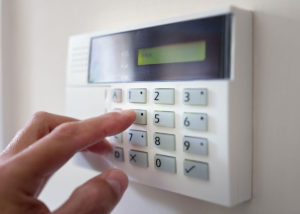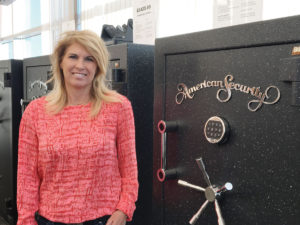5 ways to keep your small business protected
 There’s one thing experts agree upon: All businesses, even the smallest, should have a security plan in place as part of their regular business policies.
There’s one thing experts agree upon: All businesses, even the smallest, should have a security plan in place as part of their regular business policies.
“For a small business owner, I think it’s almost more important because they have fewer employees and more at risk,” says Karen Goldsworth, the sales manager for Strauss Security Solutions in Urbandale. There is often less oversight within a small business because fewer people have more responsibilities, and security procedures could be overlooked, she says.
Just because a business is small doesn’t mean it is immune to a burglary or another loss of its assets. Police officers and security guards agree that it is better to be safe than sorry, for individuals to be aware of their surroundings and to report suspicious behavior or situations.
“The biggest security is being situationally aware,” says Sgt. Steve Nore with the Johnston Police Department. “Most people know if their hair is sticking up on the back of their neck or they feel uneasy. We would rather get a call than find out that something could have been prevented.” Here are five things to consider when creating
your business’ security plan:
1. What steps do I need to take?

First, a business needs to develop its security policies, Nore says. This plan — the primary focus is how to keep employees safe — will include a range of scenarios such as how to handle a disgruntled customer or a former
employee who shows up at the office and becomes threatening, or what to do if a suspicious package is delivered to the office, and the actions to take as a result.
The plan will take into account employees’ lives and safety, as well as the physical assets of the business — the building, inventory and other supplies — and the cybersecurity, network and anything that pertains to the
intellectual property of the business. There are both internal and external security risks, according to Business News Daily, a resource for small business owners.
An inspection and evaluation of the workplace is usually a good place to begin. Business owners can consult with a security assessment firm, Goldsworth says. A security expert can work with the business owner to determine their needs and what they can receive for their budget. A business owner may have a sense of what they need based on an incident that has occurred, or they may need more guidance from the security expert.
The evaluation will ensure the business protects the correct vulnerabilities and assets and installs an appropriate system to address those issues. Business owners may consider:
• Are they located in a neighborhood where there is crime or where activity occurs after hours such as an entertainment district or near a restaurant or retail store?
• Are visitor entries clearly identified?
• Do visitors have free-range access to all parts of the building, or do they have to check in?
• Are exterior doors not used as entry points kept locked?
• Are windows locked?
Some businesses may also consult with a professional security company that specializes in on-site security guards, patrol security and alarm response.
Businesses need to be prepared ahead of time, human resource experts say. Policies and procedures should be in place that include steps to keep the physical workplace safe, as well as a company’s employees and intellectual property.
This includes ensuring the appropriate amount of staff is present when an employee is terminated or hiring temporary security personnel if a firing is expected to become violent. A supervisor needs to escort the
terminated employee to his or her desk to retrieve their personal belongings and to ensure there are no threats to other employees or damage or theft of company property.
A business’ security policies also will handle aspects of technology, specifically for terminated individuals, and include a plan for removing the person’s access to the network and email system and changing his or her access codes and passwords. A security assessment company can review a company’s cybersecurity policies and procedures to look for gaps and create a response plan that will include protection of hardware and other
equipment.
It’s important that all employees know their role in the security plan and understand how they should respond to threats and how they will be notified if there is need to enact the plan.
2. Who is most affected?

Some aspects of security will vary by industry; however, most businesses could still benefit from an alarm system, Goldsworth says. This will prevent or remedy most types of theft, both internal and external.
Construction companies often use surveillance equipment to view still pictures of people entering and leaving a worksite and to record their coming and going.
“Cameras on job sites has become very common,” Goldsworth says.
There may be a time when a business undergoes remodeling or a new building is constructed. Crime and vandalism at sites can add more expense to a project and dig into profits. A site can be made more secure if all of the parties involved, including workers, adjoining property owners and law enforcement are aware of the work and asked to report suspicious activities or theft and asked to help keep watch. A fence around the site, nighttime
lighting, lockable gates, no trespassing signs and a check-in and out system also can help secure the site.
Banks and schools are other establishments that need enhanced security. One bank in Johnston keeps its doors locked at all times and requires customers to be buzzed in by an employee. This security measure helped prevent an attempted bank robbery because the person was unable to get into the building, Nore says.
Many business owners will have to handle an upset customer or employee who has been fired. It’s good to be prepared for those situations, Nore says, and to know that the police are there to help.
“A lot of times we just come out and mediate,” he says. “Just because the police show up, it doesn’t mean someone has to go to jail.”
If a former employee shows up on site and is causing problems, it’s sometimes better for the police to advise them they are trespassing and to help calm them down.
“If someone has a situation that is making them uncomfortable, they can call the police,” Nore says.
Another situation that any business needs to be prepared for is what to do if a suspicious package arrives at the office. Such packages often arrive with too much postage, no return address and excessive amounts of tape. Businesses need to notify their police department if one arrives, Nore says.
“The biggest thing is that once you find the mail, set it to the side,” he says. “Don’t open it and restrict access to it until we can look at it. If it’s nothing, it’s nothing. But if it’s something, at least we know about it, and we can try to mitigate.”
3. What type of system do I need?

Security procedures can be broken down into several areas: access control, a security system, physical monitoring of the site and communication of the plan.
Access to the building or site can be controlled with keys or access cards. A high security cylinder allows for total key control and makes it impossible to duplicate keys. Goldsworth says this is a popular option for churches and buildings that host numerous meetings. It allows for individuals to have keys to open the doors, but it prevents them from being copied.
“You could still give the key to another person, but the keys are numbered, and we recommend you keep track of that,” she says.
If this is determined to not be adequate enough, the business can install an access card system to control who enters and leaves the building and to limit their entrance to specific times of day or days of the week.
A security system can be installed that is monitored by an outside company or automatically notifies emergency personnel if a situation occurs at the business. Be mindful of who receives the code and change it anytime an employee leaves the company.
An alarm system with a keypad can be installed to monitor particular areas or zones of a business. A digital system is best, says Jacob Engel, a security services manager with Strauss, because it is wireless and doesn’t need a phone line, can better transmit information and additional areas can more easily be added to monitor because it doesn’t require any hardwiring.
Security cameras add another level of security.
“If they have all of those things in place, that really is going to cover just about anything as far as a security breach or being able to detect a security breach,” Goldsworth says.
Nore says security camera act as a deterrent, as well as help police identify criminals after an activity has occurred. “Hopefully, it will deter people,” he says.“People who might have bad intent and see a security camera might move on.”
He continues: “Security cameras are always a good idea regardless of what industry you work in. It could prevent issues with employee theft — not just outside theft but internal, too.”
A safe is another good measure for businesses to have, she says, as it helps the business protect cash on hand, important documents or other valuable information that needs to be kept on site.
A business owner or supervisor can play a role in security by walking around the site to keep an eye on what is happening. They should also encourage their employees to be observant while on the job and when arriving and leaving. Individuals who are not recognized should be questioned about their whereabouts, and any security cameras should be running at all times.
4. Can I afford this?
The cost of a security system will vary widely depending upon the options that are chosen. After a company purchases its equipment, it will also need to factor the cost of an alarm service. Goldsworth says this can run about $40 a month. A web-based card access solution also has a monthly fee attached to it depending upon the number of doors to the business, and keys are purchased per number. Security cameras cost a minimum of $500 and will have additional costs if the business wants an outside source to monitor the footage.
Few small businesses hire security guard companies, Goldsworth says, because of the cost associated with it, unless they are part of a franchise that requires it.
It can cost between $10 and $100 an hour to hire a security guard depending upon the industry and whether he or she is armed.
A safe can run from several hundreds of dollars to thousands depending upon its size and fire rating.
5. Are there other options?
Companies can take other steps to increase security. One is to have an employee in place at the front of the office or building who acts as a barrier between the public and the rest of the office.
If this person deems someone or a situation as a threat, he or she can push a panic button — if connected to the security system — call 911 or say a code word that notifies others in the office there is a situation, Nore says.
Even if the person can’t speak into a desk phone or their cell phone, a 911 call will open up a line of communication between emergency dispatch and the business, so police can respond, Nore says.
“As soon as that call is made, it’ll show the location of the call,” he says.
Every business also should have a code word, he recommends, that once said, makes employees realize there is a situation happening in which extra personnel are needed or someone needs to call 911.
Businesses also can call their local police department to file an extra watch request. In Johnston, police officers have a set of businesses and houses that have experienced an issue of some sort and need extra patrolling, which is done daily or several times a day, Nore says. Most police departments will offer this service, if the
business owner calls and explains their situation, he says.
Businesses owners can take many steps that don’t cost money to increase safety:
• Remind employees of security procedures and test them on what to do to keep policies fresh in their minds.
• Be mindful of how products are placed in store windows to discourage thieves.
• Keep doors and windows locked when not in use.
• Check with your insurance company to see if installing an alarm or security system will provide a discount or other savings. ♦


superbeets review
Great post! We will be linking to this particularly great post on our site. Keep up the good writing.|